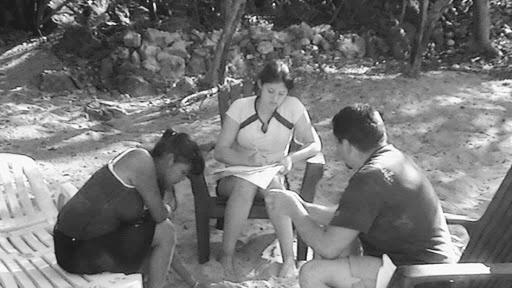
When I compare my life to hers, I am extremely lucky. We are both sixteen-years-old, residing in different countries and living very different lives. I just celebrated my birthday, I am excited about getting my driver’s license this month, and I spent mid-winter break with my family in Mexico. That’s where she lives – she works for the Razos, our family friends, who we stayed with on our one-week vacation. She cleaned the rooms we slept in, made dinner for all of us and helped out with their baby. Her name is Andrea. With the limited amount of Spanish I knew, I tried to communicate with her – mostly relying on body language and smiles as she passed me and occasionally met my gaze.
Every day at 7:00 am, she and her mom, Rafaela, came to the house to start their chores. At first I thought only wealthy families had maids; however, in Mexico it is common for middle class families to have them as well. As Andrea was delivering breakfast to us one morning, my parents laughed, saying, “Could you ever imagine Julia making us a great breakfast, cleaning up the plates afterwards and then doing the dishes?” They were joking of course, but their amusement made me think… what if I had no other choice; what if that was me in Andrea’s shoes? I asked her how old she was. She replied, “sixteen.”
After this, I tried to help her with the housework as much as I could, doing little things like taking the dishes to the sink and keeping my bathroom clean. Then, I heard Atalia Razo, or Mrs. Razo, say that Andrea had decided to quit school. My curiosity grew and I wanted to know more about her life.
The Razos invited Andrea to the beach with us, and she gladly accepted. It was her first time seeing the ocean. Andrea stared at the ground and let the sand run through her fingers as I asked her questions – she rarely looked up . As I spoke with her, I learned that she started working when she was twelve years old, selling t-shirts. At age fourteen, Andrea’s mother, Rafaela, asked her to start helping her clean the Razo’s house because she had diabetes and felt safer with Andrea being there, in case anything were to happen. She accepted. All the while, she was going to school.
At age sixteen, and having recently graduated middle school, (I learned that kids in Mexico start school at age 7) Andrea had been to school longer than anyone else in her family had. Her older brother, Martin, quit school in seventh grade to start working. Her grandmother never permitted Andrea’s mother, Rafaela, to go to school because she needed her to work, and her father had gone to school until fourth grade for the same reason. Her younger brother, Juan, who is 9 years old, is still attending school.
As Andrea spoke, Mr. Razo translated, explaining how the public school system works in Mexico. Public schools have a limited amount of spots for students. Although the price varies, in Andrea’s situation each student was required to pay $75 in order to apply to the school. However, like Community High School, it is a lottery. The worst part is that if you do not get in, your money is not refunded, and you must wait another year and pay another $75 to apply again. Unfortunately, this is what happened to Andrea.
$75 is a considerably large amount of money to pay for poor families, especially because they are taking the risk of losing it. Andrea believes she didn’t get chosen because she lives a few kilometers outside of the school’s district. She was upset. “ She felt really bad because she feels that education should be free and for everyone,” said Mr. Razo. I couldn’t agree more.
Mr. Razo explained that most families that can afford it, choose to send their children to private schools. However, it can be very costly to do so. “Our public education is very poor and not sufficient,” he said. Mr. Razo gave me an estimate that private schools can cost anywhere from $300-$800, depending on how well the school performs and the area. Compared to the $75 to enter the public schools, this is an outrageous amount of money, “The government should give more budget to education,” Mr. Razo commented.
According to Mr. Razo, in most cases, only private schools teach you how to speak English and study computers. This gives those in public schools an unfair chance at competing in the workforce for good jobs.
This leads me to wonder what the options are for the students who aren’t accepted into the public schools. When I asked Andrea though, she didn’t feel comfortable being interviewed any longer. Mrs. Razo suggested it was because she was used to being ignored and inferior in society and was uncomfortable with my interest in her and her life. I felt horrible.
I continued to interview Mrs. Razo and she told me that her mother was a teacher in a public school near Andrea’s house and was willing to get her into the school. However, Andrea refused. “I think they don’t want to be a pain and [want to] do things on their own,” said Mrs. Razo.

She also offered to give both Andrea and her mother driving lessons so they wouldn’t have to travel on the bus for an hour and half to her house each morning and back. They also refused. However, the rejection didn’t surprise Mrs. Razo, “Usually that happens to the lower social economic people,” she said, “They have to do it with their own hands. They don’t want your pity. They want to feel like they do it themselves, and I respect that.”
The Razos are much closer with Andrea and her family than most are with their housekeepers. This is because Andrea’s father has been Mrs. Razo’s father’s gardener as long as she can remember. Mrs. Razo recalls a time when Andrea’s mother was having complications with her pregnancy and Mrs. Razo’s father rushed the car over and drove her to the hospital. Mrs. Razo’s father even offered up one of his houses to Andrea’s family to throw Andrea a party of some sort. Starting out poor himself, Mrs. Razo’s father understands their hardships.
Mrs. Razo also pays Rafaela, $19 a day for the five hours she works for her every Monday, Wednesday and Friday. The other two days, Rafaela cleans Mr. Razo’s office. The average amount of money a maid gets paid per 5 hours is $13, Mrs. Razo estimates. She also allows Rafaela to bring her youngest son Juan in when she can’t find anyone to watch him. “I really want them to be comfortable and I trust them so I can leave them alone in my house,” she said.
While Andrea and her family live in a house that her father built himself with three bedrooms and no running water, Mrs. Razo considers them to be on the higher end of the poor spectrum. Although Mrs. Razo thinks Andrea will not continue with her education, she considers Andrea to be more fortunate than others because her parents support her in continuing her education and they do not ask her for the money she makes. Mrs. Razo wishes Andrea would take advantage of the opportunities her family has given her; however, she respects that she does not, “I think she would rather just have the money,” she said.
When I asked Mrs. Razo if Andrea is considered to be on the high end of the poor spectrum, then what are people like her and me? She just shrugged, and I guess that’s just it…we are lucky.






